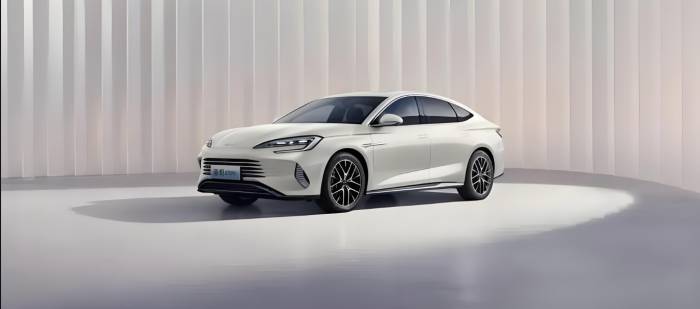BYD Rumors Sell Out.
Two days ago, a statement by BYD (002594.SZ) executive Li Yunfei caused a stir in the capital market. The general idea was: "The orders for Qin L and Seal 06 are extremely large, after much thought, we decided not to disclose the sales data for the time being, fearing it might cause an industry shock."
So, the "little essay" came. There are rumors that BYD Qin L's order volume is expected to reach 1 million units, and Seal 06's order volume is expected to be 900,000 units. On June 11th, an automotive blogger disclosed a set of data, claiming that "the cumulative new orders for BYD Qin L + Seal 06 have broken through 80,000."
Regardless of the exact numbers, the capital market is certainly excited.
On June 11th, which was the first trading day after the Dragon Boat Festival, BYD's stock price surged by 3.88%; since the launch of Qin L, BYD's stock price has accumulated a 22% increase. It is important to emphasize that, looking at the monthly line, BYD's stock price has risen significantly for five consecutive months.
Clearly, in the eyes of the capital market, BYD is currently unstoppable and breaking through barriers!
On June 3rd, BYD announced its sales data for May.
BYD's May sales volume was 331,800 units, a year-on-year increase of 38.25%, and a month-on-month increase of 6%. Some might think that while this data is good, it doesn't seem to be explosive. In fact, the key lies in the expectations for the future market.
The Song L DM-i is expected to hit the market soon without any surprises; further down the line, there might also be the Han L DM-i, Tang L DM-i. That is to say, if Qin L can sweep the automobile market around 100,000 units, then Song L, Han L, and Tang L should theoretically be able to do the same.
In that case, BYD's monthly sales volume may quickly reach 400,000 units, or even 500,000 units.Friends, this is a rather alarming figure.
According to data from the China Passenger Car Association, the wholesale sales volume of new energy passenger cars produced domestically in May was 910,000 units, with BYD alone accounting for a market share of 36.5%; even without distinguishing between energy types, this figure reached 19.7%. This means that for every five passenger cars sold, one is a BYD. In BYD's view, no matter whether it's a joint venture brand or a domestic self-brand, none can compete.
And this brings us to the price war.
At the 2024 China Automobile Chongqing Forum, the chairman of GAC Group took the lead in firing the first shot, publicly opposing the price war. Following suit, the director of Geely also stated, "The result of a simple and crude price war is cutting corners, fraud, and disorderly competition without compliance."
In response to this, BYD made a public statement:

"In 2022, due to the rise in battery raw material costs and the phase-out of subsidies, new energy vehicles increased in price, and we also raised our prices twice. But now, the price of battery raw materials has dropped significantly, coupled with the advantage of scale, so we are lowering our prices. You can't say that when the price of battery raw materials rises, you raise prices, but when the prices plummet, you don't lower them."
In a nutshell, the reason behind BYD's price reduction is the decrease in battery raw material prices and the highlight of scale advantages!
Moreover, BYD made a devastating remark:
"It's like everyone playing cards together; if someone plays their cards, you can either follow suit if you can, or not if you can't. Don't get angry, and don't flip the table."
Let's focus on BYD's move towards high-end.
(Note: The translation is done to the best of my ability to convey the original meaning and context of the text provided.)BYD holds an absolute say in the new energy vehicle market below 200,000 yuan, especially below 150,000 yuan. However, in fact, BYD is also steadily advancing in the high-end market.
In May of this year, Denza sold 12,000 units, with a total of 47,300 units for the year, securing a place among the new force brands. In addition, the sales of the Yangwang brand and the Equation Leopard were 608 and 2,430 units respectively. Although the data may seem average at first glance, as a brand-new high-end brand, this performance is quite commendable.
In a word, whether in the mass market or the high-end market, BYD is forging ahead.
Lastly, let's talk about the European Union's taxation on Chinese electric vehicles.
According to the EU's announcement: "If a solution cannot be reached with the Chinese side, the imposition of tariffs will be implemented around July 4th. Among them, a 17.4% tax will be imposed on BYD, while Geely and SAIC will be taxed at 20% and 38.1% respectively, and other car manufacturers will be taxed at 21%."
An important reason why BYD is taxed at the lowest rate is that BYD's selling price in Europe is much higher than in China, making it difficult for the EU to find an excuse for countervailing duties. Therefore, with the cost advantage of Chinese manufacturing and the increase in terminal prices, it should not be a problem to theoretically cover the tariff costs.
Of course, some may argue that the EU can impose a 17.4% tariff today and change it to 30% or even 50% tomorrow. To address this issue, the only solution is to build factories in Europe.
In December 2023, BYD announced the construction of a new energy vehicle production base in Hungary. Barring any unexpected events, with the EU's imposition of additional tariffs, the process of building factories overseas may be further accelerated.
So, let's look forward to BYD sweeping across Europe.

Comments